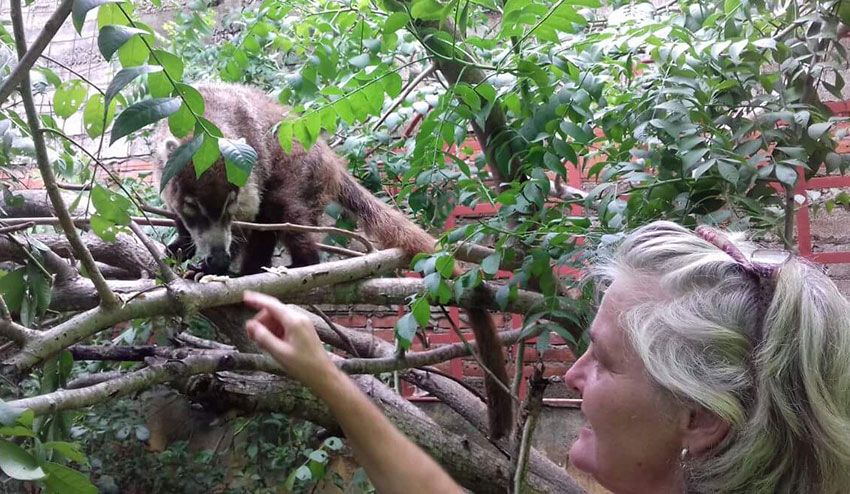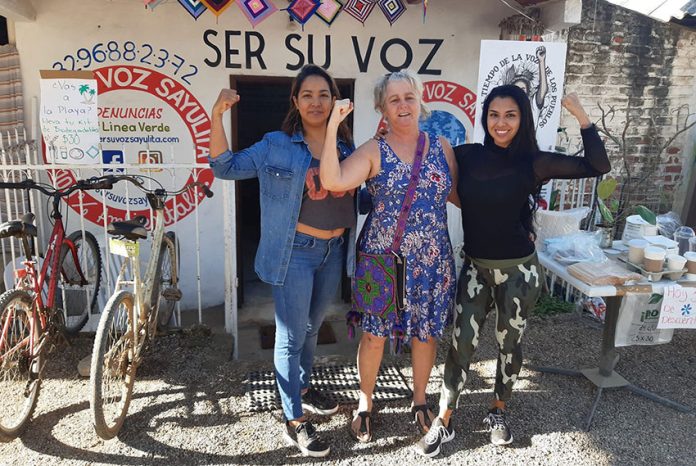Environmental activist Tracie Willis is ready for a fight. And she needs others to join her.
“We need a shift in consciousness, globally. Fast,” she says and looks out through the windows of the swanky Mediterranean restaurant in the Condesa neighborhood of Mexico City where we’ve met to chat.
Her eyes are still wet from the tears she cried as she told the story of Tomás el Tejón, a white-nosed coati she rescued from 10 years of captivity that recently died. She had found it toothless in a tiny cage in a neighbor’s yard, sick from the fumes of garbage burned right next to it.
“I couldn’t believe that my species could be so cruel,” she said. “But he died happy, he was OK. He was never hungry anymore. He started the whole movement.”
That movement led to her founding Ser Su Voz (Be Their Voice), an environmental nonprofit based in Sayulita, Nayarit, which Willis has called home for the last three decades.
Willis has dedicated her life to protecting wild species that are not able to speak for themselves. She has worked to protect the endangered vaquita with the Sea Shepherd Conservation Society.
Her most recent conservation work focuses on parrots, macaws and the small green parakeets that, despite their threatened status, are a common pet all along Mexico’s Pacific coast.
That work has had its consequences. In January Willis was attacked by two men connected to the illicit exotic bird trade in Nayarit. The men stabbed her in the head, abdomen and leg.
Two days later, she filmed herself smashing metal birdcages to bits with sandaled feet and posted it to Facebook. Two hours after that the man she had identified to police as a local illegal bird vendor called her and threatened to kill her.

She believes that she is somewhat protected by virtue of her Canadian citizenship but that does not guarantee her safety.
Her Mexican counterparts, however, are usually not afforded the luxury of a warning.
She laments the recent losses of butterfly conservationists in Michoacán. The body of Homero Gómez González, director of the El Rosario butterfly sanctuary in Angangueo, was found in a well on January 29 after a two-week disappearance. An autopsy showed signs of head trauma.
Just three days later, the body of one of the park’s tour guides, Raúl Hernández Romero, was found with stab wounds less than a week after vanishing.
The common thread that runs through these and so many other attacks on environmentalists in Mexico in recent years is the utter impunity enjoyed by the perpetrators of such violence.
Investigators have not found official links between Gómez’s death and his conservation work, but it is well known that his efforts had come into conflict with the interests of illegal logging and organized-crime-related avocado growing operations in the region.
People like Rarámuri activist Julián Carrillo — murdered in October 2018 after being threatened for defending ancestral land in the Sierra Tarahumara — have been killed despite being ostensibly safeguarded by a government program that offers protection to activists and journalists.
The principal flaw in the program seems blatantly apparent on its website, which asks, “Have you suffered an aggression as a result of your work as an activist or journalist?” For people like Gómez, Hernández, Nora López, José Luis Álvarez Flores and too many others, the government seems to be asking that question far too late.
The environmental and human rights organization Global Witness reported in October that such violence in Mexico saw a drastic spike in 2017, when the number of murdered activists rose to 15 from three the year before. The trend has continued since: 14 in 2018 and 12 in the first 10 months of 2019.
I ask Willis why she thinks that is.
“Lack of space. Human population growth. We think the whole planet is ours, and it isn’t. We’re spreading out and we need more land to grow more food, and it’s encroaching into animal habitats … It’s supply and demand. Follow the money,” she says.
“[If] we want to save any animal, we just have to save its habitat and leave it alone. That’s the only way.”
But that is easier said than done when their protectors need protecting themselves.
In the apparent lack of government efforts to protect them, aside from hiring personal bodyguards, environmental activists have few resources available to stay safe.
A private company donated security cameras to Willis, but beyond that she has received little institutional protection. A police officer assigned as security detail after her attack stopped by her house twice to take photos.
She believes that public attention is the best protection she and other activists can hope for.
She has the whole town watching out for her now and says that the only reason she is still alive is because the news of her attack and videos of her antics (she can also be seen online dressed up in a big green bird costume at events) went viral.
“I think Mexico is under pressure to be more environmentally concerned, under pressure on a global level,” she says, and hopes that the pressure can lead to the consciousness shift she mentioned.
But she isn’t waiting around for the world to change. Despite the threats to her life, she sees Ser Su Voz expanding to other parts of Mexico, finding more people to speak out for nature’s voiceless inhabitants.
“I’m going to fight my species to the end. I’m going to defend nature to the end … and I’m not scared. I’m really not scared.”
Mexico News Daily
